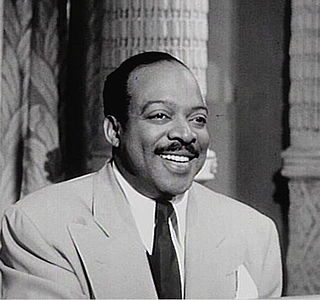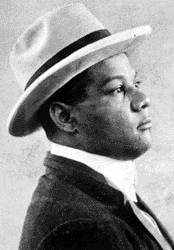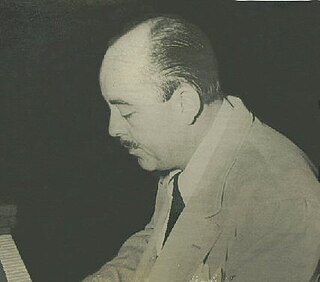This article includes a list of references, but its sources remain unclear because it has insufficient inline citations .(September 2011) (Learn how and when to remove this template message) |
Wendell "Cassino" Simpson (July 22, 1909 – March 27, 1952) was an American jazz pianist, best known for his associations on the Chicago jazz scene.

The United States of America (USA), commonly known as the United States or America, is a country composed of 50 states, a federal district, five major self-governing territories, and various possessions. At 3.8 million square miles, the United States is the world's third or fourth largest country by total area and is slightly smaller than the entire continent of Europe's 3.9 million square miles. With a population of over 327 million people, the U.S. is the third most populous country. The capital is Washington, D.C., and the largest city by population is New York City. Forty-eight states and the capital's federal district are contiguous in North America between Canada and Mexico. The State of Alaska is in the northwest corner of North America, bordered by Canada to the east and across the Bering Strait from Russia to the west. The State of Hawaii is an archipelago in the mid-Pacific Ocean. The U.S. territories are scattered about the Pacific Ocean and the Caribbean Sea, stretching across nine official time zones. The extremely diverse geography, climate, and wildlife of the United States make it one of the world's 17 megadiverse countries.
Jazz is a music genre that originated in the African-American communities of New Orleans, United States, in the late 19th and early 20th centuries, and developed from roots in blues and ragtime. Jazz is seen by many as "America's classical music". Since the 1920s Jazz Age, jazz has become recognized as a major form of musical expression. It then emerged in the form of independent traditional and popular musical styles, all linked by the common bonds of African-American and European-American musical parentage with a performance orientation. Jazz is characterized by swing and blue notes, call and response vocals, polyrhythms and improvisation. Jazz has roots in West African cultural and musical expression, and in African-American music traditions including blues and ragtime, as well as European military band music. Intellectuals around the world have hailed jazz as "one of America's original art forms".

Chicago, officially the City of Chicago, is the most populous city in Illinois and the third most populous city in the United States. With an estimated population of 2,716,450 (2017), it is the most populous city in the Midwestern United States. Chicago is the county seat of Cook County, the second most populous county in the United States, and the principal city of the Chicago metropolitan area, which is often referred to as "Chicagoland." The Chicago metropolitan area, at nearly 10 million people, is the third-largest in the United States; the fourth largest in North America ; and the third largest metropolitan area in the world by land area.
Simpson may have studied piano under Zinky Cohn. He first recorded in 1923 with Bernie Young, then recorded with the Moulin Rouge Orchestra in 1925. Following this he joined Arthur Sims's orchestra, recording with them in 1926. Sims died soon after, and Bernie Young took over as bandleader; Simpson remained in the ensemble until 1930. Concomitantly, he recorded with Jabbo Smith's Rhythm Aces on his 1929 Brunswick Records releases.
Zinky Cohn was an American jazz pianist.
Jabbo Smith, born as Cladys Smith was an American jazz musician, known for his virtuoso playing on the trumpet.

Brunswick Records is an American record label founded in 1916.
From 1931 to 1933 he played with Erskine Tate, though he never recorded with him. He recorded as a leader under various names, with Jabbo Smith and Milt Hinton as sidemen. In 1933 he cut a few sides with Half Pint Jaxon, a female impersonator.
Erskine Tate was an American jazz violinist and bandleader.
Milton John Hinton, regarded as the Dean of jazz bass players, was an American double bassist and photographer. His nicknames included "Sporty" from his years in Chicago, "Fump" from his time on the road with Cab Calloway, and "The Judge" from the 1950s and beyond.
Soon after his recordings with Jaxon, Simpson apparently became mentally disturbed, and was institutionalized in 1935 in Elgin, Illinois. [1] While there, he continued to play piano and vibraphone in a hospital dance band, and played bass drum in the hospital's marching band. He recorded solo piano numbers on the grounds of the hospital in the middle of the 1940s. [1] Simpson was never released from the hospital, where he died in 1952.

Elgin is a city in Cook and Kane counties in the northern part of the U.S. state of Illinois. Located roughly 35 mi (56 km) northwest of Chicago, it lies along the Fox River. As of 2017, the city had an estimated population of 112,456, making it the eighth-largest city in Illinois.

The vibraphone is a musical instrument in the struck idiophone subfamily of the percussion family. It consists of tuned metal bars, and is usually played by holding two or four soft mallets and striking the bars. A person who plays the vibraphone is called a vibraphonist or vibraharpist.












